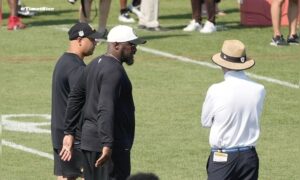Against the best secondary in the NFL, Pittsburgh Steelers quarterback Ben Roethlisberger completed 24 of 37 passes for a completion percentage of 65, throwing for 339 yards. In 17 regular season and postseason games, the Broncos have only given up 300 yards through the air twice, and both games were helmed by Roethlisberger.
Of course, that didn’t translate into a victory this time around. Roethlisberger was unable to find the end zone through the air in the Mile High city yesterday, while he was able to do so three times when the Steelers played the Broncos in the regular season—though he also threw two interceptions.
Roethlisberger was playing with an injured shoulder that kept him out of practicing for the majority of the week, limited to throwing the ball only on the Friday before the game, but that was apparently enough for head coach Mike Tomlin, the coaching staff, and his teammates to be comfortable in his ability to execute the necessary throws, as was strongly indicated by their decision not to dress Mike Vick as a third quarterback.
In fact, there were really no obvious moments over the course of the entire game that would strike one as having had been the cause of having an injured throwing shoulder. It certainly seemed as though he was making a point on the first play of the game to get plenty of air on a first-and-1o deep ball that handily overshot his intended receiver, signaling to all interested parties that he would not be limited.
And he wasn’t as should be implied by the fact that he averaged 9.2 yards per pass attempt against a Denver secondary that allowed a league-low 6.2 yards per pass attempt. It is safe to say that, for the most part, Roethlisberger didn’t have a great deal of trouble moving the ball.
But the fact that the offense only managed to score 13 points in the time that really mattered—the late field goal came with under 20 seconds left and the Steelers had no timeouts and required a successful onside kick recovery and a touchdown and extra point to tie the game—tells you that it was far from as sharp as it needed to be.
There were a couple of dropped passes, and other passes that were bobbled that minimized possible gains or actually resulted in losses. Too often during the early stretch of the game, the Steelers put themselves in unmanageable third-and-long situations.
Roethlisberger played a good game overall, but it simply wasn’t enough, and it rarely is when you only score 16 points. The fact that the Steelers were leading with 10 minutes left to play—with just over three minutes to play, in fact—however, should tell you how important the defensive effort was in shaping the outcome of this game.
We probably will never know the actual extent of the injury that Roethlisberger was dealing with, and whether or not it was embellished—though he has played well coming off of a shoulder injury before—but ultimately, what matters is that he and the offense were not able to do enough to win yesterday.








